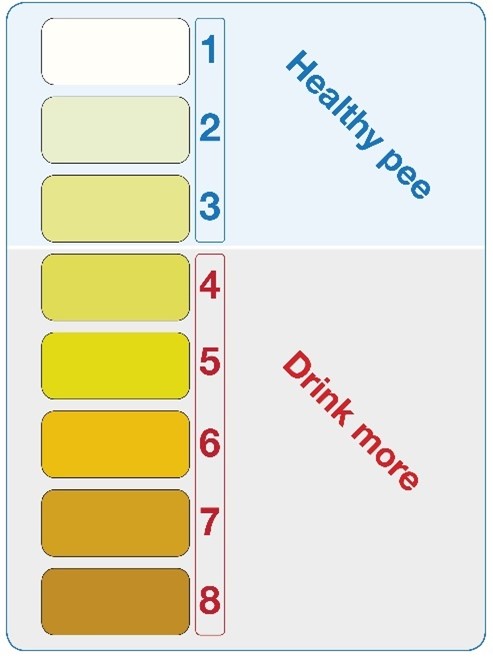How much water should I drink in pregnancy?
Keeping hydrated is important in pregnancy
When you do not drink enough fluid (water), you can become dehydrated. This is where your body loses more fluid than it is taking in. If you are being sick or sweating a lot, which can happen during pregnancy, you can become dehydrated quickly.
Drinking enough can help you feel well during pregnancy. It will also help with some common pregnancy problems, such as constipation and tiredness.
You should drink enough during the day so your pee is a pale, clear colour. This image from NHS Inform shows the colour scale for your wee, from healthy to dehydrated.

What are the signs of dehydration?
If you have any of these symptoms, you may be dehydrated:
- feeling thirsty
- pee that is dark yellow or strong-smelling
- feeling dizzy or lightheaded
- feeling tired
- having a dry mouth, lips and eyes
- not weeing very often, fewer than 4 times a day.
Speak to your GP or midwife if you are worried about how much fluid you are drinking. You should also contact them if you have signs of dehydration that do not go away when you drink more.
How much do I need to drink in pregnancy?
You need to drink 6 to 8 medium (200ml) glasses of water or fluid a day, or 1.6 litres. All drinks count, including hot drinks such as decaf tea and coffee. It is important to limit drinks that contain caffeine during pregnancy, as too much can affect your growing baby, this includes energy drinks and cola. It is also important to avoid too many fizzy drinks or drinks that are high in sugar as part of a healthy diet.
Healthy drinks choices include:
- water
- fruit or herbal teas (that are suitable for pregnancy)
- fresh fruit juice (stick to one glass a day, which also counts as one of your 5 a day)
- skimmed, 1% or semi-skimmed milk or plant-based milks.
Try to drink 1.6 litres of fluid a day. Carrying a one litre bottle of water with you allows you to keep track of how much you are drinking throughout the day.
How can I stay hydrated if I have morning sickness?
If you are being sick often, you may be at higher risk of dehydration. Keep drinking fluids and try to drink little and often, which can be easier than drinking large amounts at once.
Try keeping a glass or bottle of water close and take regular small sips rather than big gulps.
If you can’t keep any food or drink down, or you are worried at all about pregnancy sickness, see your midwife or doctor.
When are you at higher risk of dehydration?
If you are being active, or if the weather is hot, there is a greater risk that you will dehydrate. To stay hydrated, you should make sure you drink more fluids. Find out more about exercising safely during pregnancy. Making homemade icelollies from fresh juice can be a great way of keeping cool in hot weather.
If you have diabetes, dehydration can happen more easily and you should speak to your health care team about how to make sure you stay hydrated.
Sickness and diarrhoea
If you are being sick or have diarrhoea, your pharmacist can give you oral rehydration sachets that you mix with water and then drink. These can help replace the sugar, salts and minerals that your body has lost. But it is always best to check with your GP or midwife if you are concerned about sickness or diarrhoea.
Fasting during pregnancy
We would recommend that you do not fast during pregnancy for the health of you and your baby. However, it is a personal decision and if you decide to do so, you should speak to your midwife or doctor for advice.
National Institute for Health and Care Excellence (2013) Nausea/vomiting in pregnancy, NICE clinical knowledge summaries 2013: http://cks.nice.org.uk/nauseavomiting-in-pregnancy#!topicsummary
NHS Choices [accessed 27/06/2020] Dehydration: https://www.nhs.uk/conditions/dehydration/
NHS Choices [accessed 28/10/20] Should I limit caffeine during pregnancy? https://www.nhs.uk/common-health-questions/pregnancy/should-i-limit-caffeine-during-pregnancy/
NHS Choices [accessed 27/06/20] Water, drinks and your health: http://www.nhs.uk/Livewell/Goodfood/Pages/water-drinks.aspx
NHS Inform [accessed 28/10/20] Hydration: https://www.nhsinform.scot/campaigns/hydration
Zhang N, Zhang F, Chen S, et al. (2020). Associations between hydration state and pregnancy complications, maternal-infant outcomes: protocol of a prospective observational cohort study. BMC Pregnancy Childbirth. 2020;20(1):82.
Read more about having a healthy diet during pregnancy
-
Read more about 'Fasting in pregnancy '
Fasting in pregnancy
-
Read more about 'Understanding food labels '
Understanding food labels
-
Read more about 'Vegetarian, vegan and special diets in pregnancy '
Vegetarian, vegan and special diets in pregnancy
-
Read more about 'How to eat well in pregnancy '
How to eat well in pregnancy

